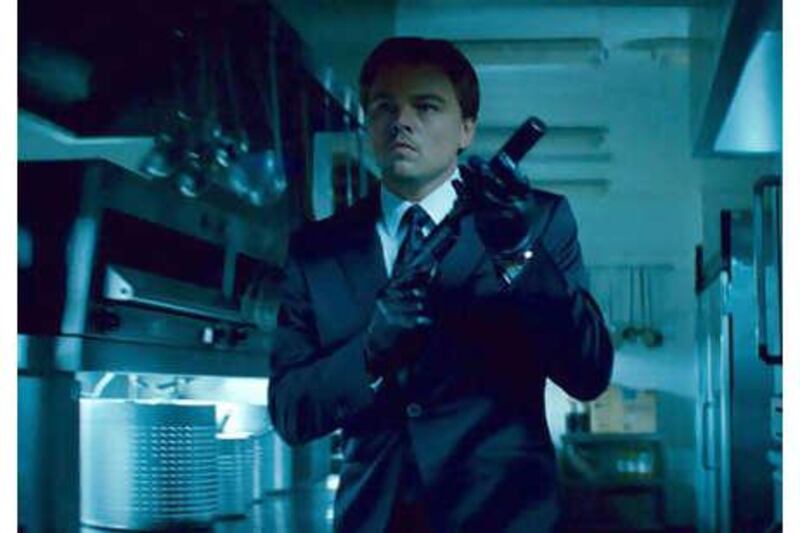It has long been a cinematic truism that context is everything. When exactly a movie is released - the films that surround it, the political climate of the day, the prevailing popular mood - is often the deciding factor in the perception of that movie's relative strengths. Certainly, this is the case with the new, mind-bending Leonardo DiCaprio thriller Inception, which has been decreed a potential Oscar champ, and "the only movie that matters this summer" (Los Angeles Times). This is not because it is innately brilliant, but simply because the qualitative bar for movie entertainment has been dropped so low by the other blockbusters in the market.
The disappointing Iron Man 2, the bland Prince of Persia, the cacophonous A-Team and the dreary Clash of the Titans have increasingly created an audience appetite for something, anything, with even a hint of originality, savvy, and brains. And Inception, let's face it, has brains. The film, which boasts an original screenplay from its writer-director Christopher Nolan (The Dark Knight), depicts a near-future world where the dreams of individuals can be invaded by stealth teams of operatives hooked up to smart suitcase-sized dialysis-style machines.
The latter dream tools, in one of the film's few early illogicalities, are explained away as something invented by the military "to train soldiers in combat without getting them killed" (whatever happened to blanks ... or paintball?). The dream stalkers themselves, led by a veteran master-stalker called Cobb (DiCaprio), typically invade the dreams of corporate kingpins, such as the opening scene's Saito (Ken Watanabe), steal information buried therein, and emerged unscathed, ready to sell the data to the highest bidder.
The hook in the plot of Inception, however, is that Saito is so impressed by Cobb's abilities that he hires him not to steal an idea from his business rival Robert Fischer Jr (Cillian Murphy), but to implant one in his head - namely that he will break up his father's energy conglomerate. And so, quicker than you can say, "The A-Team gets metaphysical", Cobb assembles his own crack squad, including a forger called Eames (Tom Hardy) who can change identity within dreams, a chemist called Yusuf (Dileep Rao) who will secretly administer dream-aiding drugs to the subjects, and a novice called Ariadne (Ellen Page) who will serve as the dream's "architect" and construct the physical reality of the dream world for Fischer's unsuspecting dreamer.
Ariadne's greater function as a clueless innocent, crucially, is to be an audience surrogate, and to provide Cobb, and the movie, with a platform for 90 minutes of almost pure exposition. Here the movie is at its original best, and indeed deserves some of the plaudits being heaped upon it. For as Cobb reveals the parameters of the dream world it becomes clear that the film is boldly poking and prodding at the very fabric of movies themselves.
For instance, when Cobb's team assemble to discuss planting the central idea (to sell off his corporation) in Fischer's mind they do so like a movie-pitch meeting, and they discuss Fischer's character motivation, narrative arcs and resolution. Or, when Cobb is teaching Ariadne about the narrative leaps of the dream world he is actually talking about editing - when they appear suddenly in the dream world's Parisian café and he asks her how they got there, the answer is obviously by the power of a film cut.
In these early sequences, the sheer level of meaning is engrossing, as Inception seems to be simultaneously talking about movies, dreams and the very nature of what constitutes our lived reality (What makes it real? What makes it worth living?). But, and it's a monumental "but", once the film finally gets going on its own ostensible mission, it falls apart. For all his virtuosity, Nolan is a half-cocked action director, and here lathers the movie with seemingly interminable and unintelligible snowbound shoot-outs (a key part of the dream occurs in a mountain hideaway). The movie's logic disintegrates completely in the last third, as dream rules alternate to suit the increasing number of plot holes.
Worst of all, the movie has no emotional resonance. Cobb is given a truly hackneyed family-crisis back story, but otherwise the film is simply technique heaped upon technique. And with a running time of two and a half hours, this eventually becomes wearisome. In short, Inception gets by with a lot of brains. But even a modicum of heart would've made it truly great.





